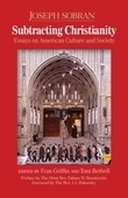
FGF E-Package
Op-Ed by Fran Griffin
February 23, 2016

Today would have been Joe Sobran’s 70th birthday.
Fran Griffin shares her thoughts on his legacy and the latest collection of his work.
Subtracting Christianity:
Sobran’s invaluable work on religion in America
by Fran Griffin
[VIENNA, VA] — Joseph Sobran (1946-2010) was an important writer of the late 20th and early 21st century. Considered by many to be the most articulate pro-life essayist of our time, nearly everything he wrote was imbued with traditional Catholic teachings, whether it be on cultural issues, politics, a proper attitude toward the state, the Constitution, or even Shakespeare.
Sobran predicted years in advance the war against Christian society, the culture of death, the decline of society, and the perils of government intervention into our lives.
Sobran came into prominence as a senior editor of Bill Buckley’s National Review magazine, where he worked for 21 years. He was a sought-after speaker and lecturer, and appeared on TV and radio talk shows throughout the country.
Sobran predicted years in advance the war against Christian society, the culture of death, the decline of society, and the perils of government intervention into our lives.
His departure from the neo-con National Review magazine in 1993 brought with it a fairly successful drive to ostracize and drive him out of the political “conservative movement.” (He and Patrick J. Buchanan had made the same “mistake” of trying to temper the drum beat for war in the Middle East.) But Joe persisted, continuing to write his syndicated column for some 30 years, writing his weekly Wanderer column for over 20 years, and having a regular commentary on CBS Radio’s Spectrum.
His own newsletter, Sobran’s: The Real News of the Month, published from 1994-2007, had some of his best and unfettered writings. At the same time, his columns could be seen in many newspapers around the country and in conservative and pro-life magazines such as Latin Mass, Human Life Review, Celebrate Life! and Chronicles magazine.
Tom Bethell, an author, and writer for the American Spectator, was a colleague and friend of Sobran’s. He urged Joe to write more about the eternal truths. Sobran, an English major who is often compared to G.K. Chesterton, enjoyed commenting on current events and on literature. His book, Alias Shakespeare: Solving the Greatest Literary Mystery of All Time (Simon & Schuster’s The Free Press, 1997) made a compelling case that the “Shakespeare” plays and sonnets were written by Edward de Vere, the 17th Earl of Oxford.
But Sobran did heed Bethell’s advice often enough that a new collection of his work, focusing on his writing on religion, has now been published, with Tom Bethell and myself as co-editors. Subtracting Christianity: Essays on American Culture and Society (FGF Books, 2015, 456 pages) contains 117 of Sobran’s best articles. If you have never read Sobran, or even if you have, this volume is a treasure trove of succinct essays written in his trademark style.
Subtracting Christianity: Essays on American Culture and Society contains 117 of Sobran’s best articles. This volume is a treasure trove of succinct essays written in his trademark style.
The book, which is “dedicated to a resurgence of Christianity in a world that has chosen to ‘subtract’ Christ,” carries a Preface by the Most Rev. Fabian W. Bruskewitz. The famous bishop emeritus of Lincoln, Nebraska, says that this collection of essays “constitutes a true spiritual and intellectual treasure” which will “cause reflection and profound contemplation on the part of the attentive reader” and “a genuine enrichment of the reader’s spiritual and intellectual life.”
Fr. J.J. Pokorsky, Sobran’s pastor and friend, contributed the Foreword to the book. “Joe loved to incite thought with profound insights and wonderful humor,” he says. “He could be a contrarian in the style of G. K. Chesterton. Like Flannery O’Connor, Joe used his genius to provoke his readers to examine their own patterns of thought and unwitting ideologies. Even now, five years after his passing, his insights, his clarity of thought, and his unique way of getting to the heart of an issue have stuck with me.”
Pat Buchanan endorses the new anthology with these words: “Christianity and the moral code it bequeathed mankind did not have a more eloquent defender in our lifetimes than Joe Sobran. His wit, his insight, his capacity to clarify, simplify, and beautify the revealed truths were unrivaled. He was a champion of the unborn who relished intellectual combat, and bore his wounds of battle bravely. This splendid collection of his essays, some of them timeless, brings his unique voice back to life for many of us.”
The title of this collection comes from the essay of the same name, “Subtracting Christianity.” In it, Sobran writes: “If God does not exist, right and wrong are reduced to subjective preferences; even human life loses its dignity. ‘Thou shalt not kill’ means no more than ‘I hope I won’t get shot.’ Laws become the amoral collective preferences of the majority.”
“In a secularized universe, nobility and honor have no meaning,” Joe continues. “Secularized culture, being negative, is only legalistic. It can’t move the heart or fill the imagination. It merely encourages grievances about an ever-widening range of supposed civil wrongs, under the general heading of ‘discrimination.’ All social relations become legal and political relations.”
In the “Words and Deeds of Christ,” Sobran writes: “Christ is still quoted after 2000 years. His words have a unique power that sets them off from all merely human words. Even two removes from their original language, they still penetrate us and rule our consciences. …They have a supernatural effect on anyone who is receptive to them.”
“If I were Pope — not that I’m seeking the office or being considered for it — I’d keep a slogan on my desk: ‘You’re infallible. Don’t blow it.’”
— Joe Sobran.Sobran begins an essay on John Paul II, “The Papal Apology,” by saying: “If I were Pope – not that I’m seeking the office or being considered for it – I’d keep a slogan on my desk: ‘You’re infallible. Don’t blow it.’” In this article, Sobran expounds on the concept that “faithful Catholics are entitled to wonder whether Pope John Paul II’s ‘apology’ for the historical sins of the Church was really a wise idea.”
In another article, “Calling All Grown-Ups,” he says: “As the state relieves us of responsibility to our parents and children, it increases our responsibilities to itself. You many divorce your spouse, desert (or abort) your children, and abandon your parents, but your duty to pay taxes is absolute. There is no divorce or separation from the welfare state, till death do you part.”
Sobran, who was devoted to the Blessed Virgin, writes exquisitely about Her, too. In “Give Me that Old-Time Unitarianism,” he opines that Our Lady “represents total humility and purity, the very opposites of the modern spirit. You can divide people into those she inspires and those she embarrasses.”
He also gives tributes to some of his favorite modern day saints: Padre Pio of Pietrelcina, Solanus Casey, and Mother Teresa. “Without knowing it, Mother Teresa had robbed the Left of its self-endowed credentials as champions of the poor. When it came to the poor, they talked the talk; but the tiny nun walked the walk.”
This is just a small sampling of the fine writing in this book. Included as well are reflections by Sobran on writers who inspired him: G.K. Chesterton, Samuel Johnson, Thomas Aquinas, C.S. Lewis, Frédéric Bastiat, Hilaire Belloc, Henry Hazlitt, Homer, and Dante. And there are articles dissecting the work and influence of those he thought were on the wrong path: Garry Wills, Andrew Sullivan, George Bernard Shaw, Oscar Wilde, John Milton, and Christopher Hitchens, the last of whom is featured in “Thank God for Atheists.”
“The progressives have found no substitute for virtue. They can offer only such morbid stopgaps as contraception, abortion, and euthanasia.” — Joe Sobran
This collection has some forthright and candid essays in the chapters, “Killing as a ‘Right’” and in “Odd Couplings,” in which he predicted (in “Sodomy and the Constitution,” written in 2003) that Justice Anthony Kennedy would be the pivotal player in the Supreme Court legalizing so-called same-sex marriage.
Ten columns are included in the chapter, “For Fear of the Jews,” in which Sobran discusses the attempted smearing Pius XII during World War II. There is a personal essay in this chapter, too, about the label unfairly ascribed to him by his enemies, “anti-Semite.” Another chapter of four columns treats, “The Return of Islam.”
In “Dark Ages, New Morality,” Joe writes: “The progressives have found no substitute for virtue. They can offer only such morbid stopgaps as contraception, abortion, and euthanasia. The Dark Ages understood virtue built a civilization; the progressive age doesn’t understand virtue and is tearing down the civilization it inherited. Euthanasia is a fitting symbol: the last sacrament of a society that cannot aspire to heaven, but only to painless annihilation.”
In one of his last essays, “Sodomy, Abortion, and the Forces of Hate,” written five months before his untimely death in 2010, Joe wrote: “In those sweet days of yore, Winston Churchill could call a political foe a ‘disgrace to pederasty,’ and we could laugh at the naughty witticism, if we even knew what pederasty was. Liberals now call the normal aversion to sodomy ‘homophobia,’ even though it springs from well-founded concerns about health and sanitation as well as morality.”
In “The Expurgated Christ,” Joe takes apart the “Jesus Seminar” which, in the spirit of Thomas Jefferson, has blue-penciled many of the words of Christ. As Joe writes, “the result is a paltry figure nobody could worship. Had this ‘historical Jesus’ really existed, we would never have heard of Him. The message that you should be nice to others and refrain from stuff like imperial exploitation would hardly have transformed the ancient world and haunted the conscience of mankind through several civilizations to come. A man who preached such watery doctrine wouldn’t be worth crucifying.”
He goes on to say that the words of Jesus “have a unique permanence. They don’t merely survive as aphoristic wisdom: they have an authority in our hearts, even when we try to deny them. They command. We can obey or rebel. That is why Jesus is still not only loved but also hated — and why those who hate Him feel they have to profess to love Him.”
As Robert R. Reilly writes in his advance praise of the book, Joe Sobran “had a capacious, Renaissance mind, as anyone who delves into this brilliant collection of essays will see. There is ample balm for the soul here from his keen moral sense, and wit and entertainment of a high order for the mind, all delivered with impeccable style. One need not agree with all of it – Joe would probably be disappointed if you did – but who would not be better for having read it?”
###
A version of this article by Fran Griffin appeared in the Christmas 2015 edition of Latin Mass magazine.
###
Joseph Sobran: Subtracting Christianity: Essays on American Culture and Society
FGF Books, the publishing imprint of the Fitzgerald Griffin Foundation
713 Park St., SE, Vienna, VA 22180
www.fgfBooks.com
November 11, 2015
456 pages
ISBN 978-1-4951-4337-3
*Fran Griffin is president of the Fitzgerald Griffin Foundation, fgfBooks.com, and of the public relations firm, Griffin Communications, which, among other projects, published the monthly newsletter, Sobran’s: The Real News of the Month, for 13 years. She is a publisher, event manager, writer, editor, publicist of worthy causes, and a member of the lay Dominicans.
© 2016 Fitzgerald Griffin Foundation
